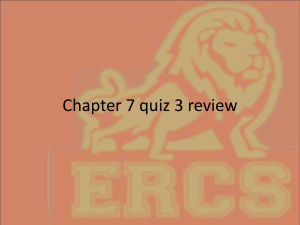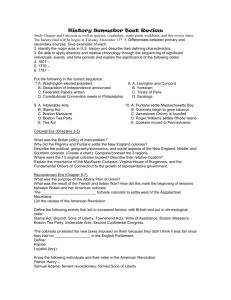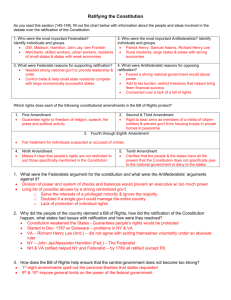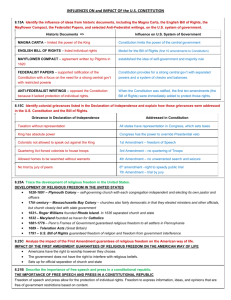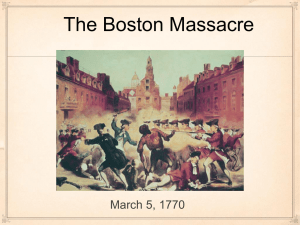US History Semester Exam Review 1. What are unalienable rights
advertisement
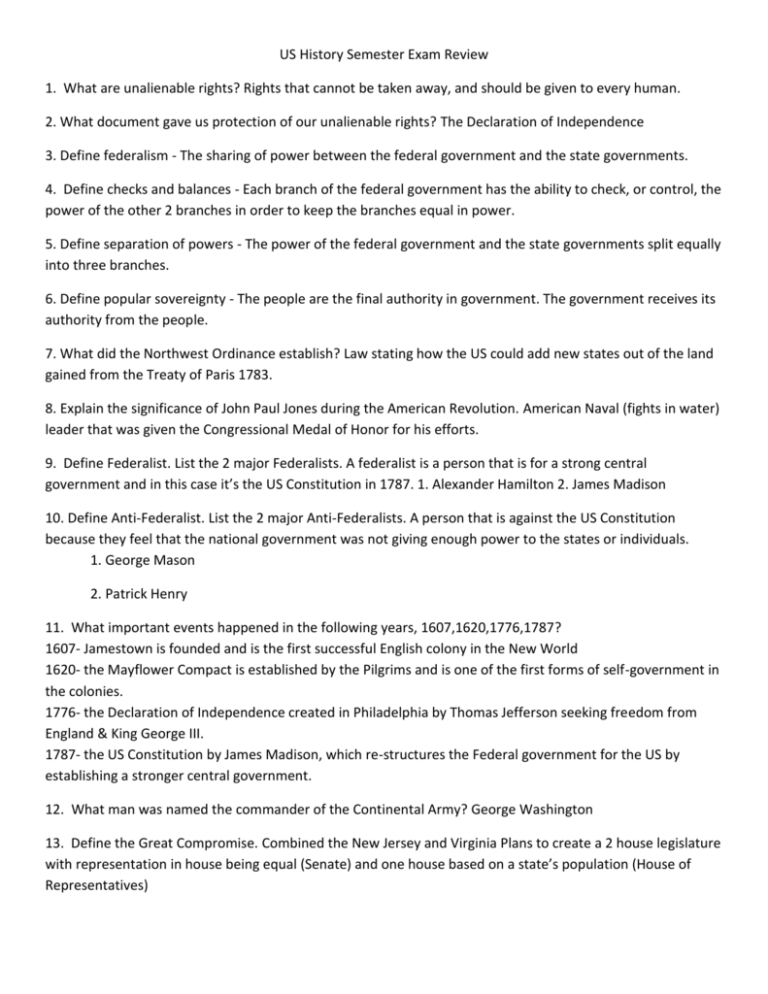
US History Semester Exam Review 1. What are unalienable rights? Rights that cannot be taken away, and should be given to every human. 2. What document gave us protection of our unalienable rights? The Declaration of Independence 3. Define federalism - The sharing of power between the federal government and the state governments. 4. Define checks and balances - Each branch of the federal government has the ability to check, or control, the power of the other 2 branches in order to keep the branches equal in power. 5. Define separation of powers - The power of the federal government and the state governments split equally into three branches. 6. Define popular sovereignty - The people are the final authority in government. The government receives its authority from the people. 7. What did the Northwest Ordinance establish? Law stating how the US could add new states out of the land gained from the Treaty of Paris 1783. 8. Explain the significance of John Paul Jones during the American Revolution. American Naval (fights in water) leader that was given the Congressional Medal of Honor for his efforts. 9. Define Federalist. List the 2 major Federalists. A federalist is a person that is for a strong central government and in this case it’s the US Constitution in 1787. 1. Alexander Hamilton 2. James Madison 10. Define Anti-Federalist. List the 2 major Anti-Federalists. A person that is against the US Constitution because they feel that the national government was not giving enough power to the states or individuals. 1. George Mason 2. Patrick Henry 11. What important events happened in the following years, 1607,1620,1776,1787? 1607- Jamestown is founded and is the first successful English colony in the New World 1620- the Mayflower Compact is established by the Pilgrims and is one of the first forms of self-government in the colonies. 1776- the Declaration of Independence created in Philadelphia by Thomas Jefferson seeking freedom from England & King George III. 1787- the US Constitution by James Madison, which re-structures the Federal government for the US by establishing a stronger central government. 12. What man was named the commander of the Continental Army? George Washington 13. Define the Great Compromise. Combined the New Jersey and Virginia Plans to create a 2 house legislature with representation in house being equal (Senate) and one house based on a state’s population (House of Representatives) 14. Define the Three-Fifths Compromise – for representation purposes 3 out of every 5 slaves would count towards a state’s population 15. Explain why the British colonists were unhappy with the Proclamation of 1763. They had just won the French and Indian War and wanted to settle all of the land West of the Appalachian Mountains all the way to the Mississippi River 16. List the rights guaranteed in the First Amendment. Speech, religion, press, assembly, petition 17. List the rights guaranteed in the 8th Amendment. No excessive bail or fines, no cruel/unusual punishment 18. List the reasons for creating the Articles of Confederation. Finance a war, negotiate treaties, prevent an executive from becoming too powerful 19. Describe the New Jersey and Virginia Plans. VA – (Big State Plan) wanted representation to be based on the state population. NJ – (Small State Plan) wanted representation to be equal for all states. 20. Explain the 3rd amendment to the Bill of Rights. No quartering of soldiers 21. Explain the 4th Amendment – No unreasonable searches/seizures 22. Explain the 5th Amendment – Due process, free from self-incrimination, no double jeopardy 23. Explain the 6th Amendment – right to a trial by jury in criminal cases, which jury duty is a constitutional right 24. What land did the United States gain after the Treaty of Paris of 1783? West of the Appalachian Mountains to the Mississippi River 25. Was Patrick Henry a Federalist or Anti-Federalist? Explain why. Anti-Federalist because he wanted more individual rights and state’s rights. 26. What was the importance of the battle of Lexington and Concord? ‘shot heard round the world’ started the American Revolution 27. What was the importance of the Battle of Saratoga? Turning point of the war because after this American victory the French became allies with the Americans. 28. What was the importance of the Siege of Yorktown? Last major battle of the war. The French helped cut off the British escape to the ocean. 29. Explain two reasons why the colonists grew increasingly resentful of Great Britain and King George III. No taxation without representation and the Proclamation of 1763 30. Explain the purpose of the Constitutional Convention? To restructure the Federal government – the US Constitution 31. What does the term “consent of the governed mean”? The people are giving the government the authority to rule by voting for their leaders 32. Why was Paul Revere’s engraving of the Boston Massacre considered propaganda? Because it was meant to try and get neutralists to join the patriot cause for freedom. 33. What was the importance of Thomas Paine’s pamphlet “Common Sense”? Convinced many colonists to join the patriot cause for independence from England 34. Describe what the soil was like in the New England, Middle and Southern colonies. NE – thin, rocky bad for growing. Middle – average soil (moderate) South – rich, fertile great for growing crops like tobacco and cotton 35. What was the importance of the Mayflower Compact? Showed the colonists could establish their own forms of self-government and be successful 36. Describe the Intolerable Acts and explain why the King passed them. Closed down Boston Harbor, sent more troops into Boston, and no more patriot meetings. King George III passed them because of the Boston Tea Party 37. Why did European countries explore in the New World? Three G’s 38. What were the Intolerable Acts? Closed down Boston Harbor, sent more troops into Boston, and no more patriot meetings 39. Explain 2 problems Washington faced when he became president. Debt from the American Revolution and people rebelling that didn’t want to pay taxes. 40. Explain the 10th Amendment. (Federalism) 41. Explain the plantation system. Utilized in the South (slaves) in order to make tobacco and cotton production more profitable. 42. Explain the significance of the following: Charleston, New York City, Boston, and Philadelphia. First 3 had major harbors for importing/exporting of goods. Philadelphia – where the Declaration of Independence and US Constitution was written.


